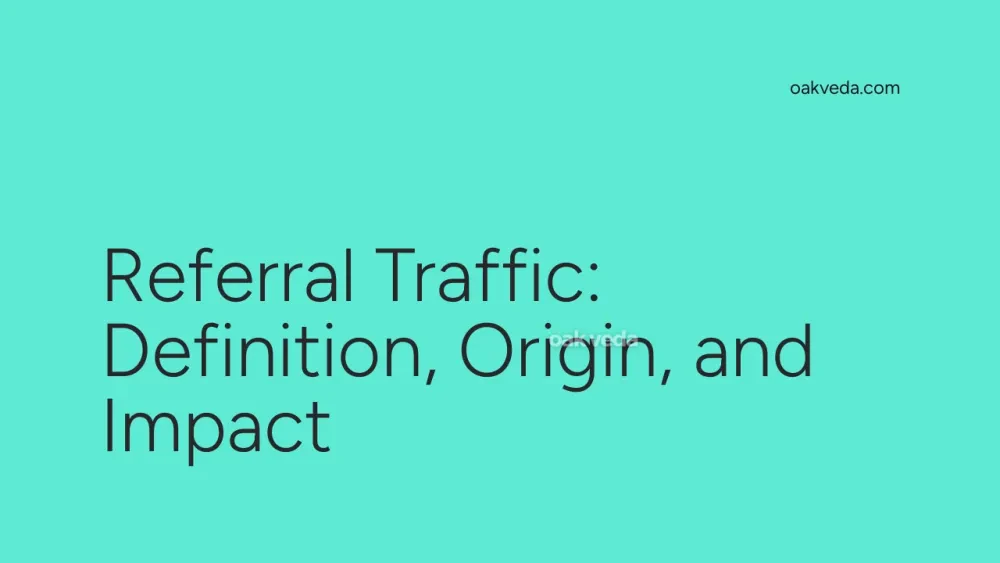
What is Referral Traffic?
Referral traffic is a crucial metric in digital marketing that refers to visitors who land on a website by clicking on a link from another site. Unlike direct traffic (where users type the URL directly) or search traffic (from search engines), referral traffic comes from external sources that link to your content. This type of traffic is valuable because it often indicates that other websites find your content worthy of sharing, potentially bringing in engaged and interested visitors.
Origin and Development of Referral Traffic
The concept of referral traffic has been around since the early days of the internet, but its importance has grown significantly with the evolution of digital marketing. As the web became more interconnected, the value of backlinks and cross-site references increased. The development of analytics tools in the early 2000s, such as Google Analytics, allowed marketers to track and analyze referral traffic more effectively, leading to its recognition as a key performance indicator in digital strategies.
How Referral Traffic Works
Referral traffic operates on a simple principle: when a user clicks a link on one website (the referrer) that leads to another website (the destination), the visit is logged as referral traffic. This process involves:
- A website (Site A) includes a hyperlink to another website (Site B)
- A user visits Site A and clicks on the link to Site B
- The user's browser sends a request to Site B, including information about the referring site
- Site B's analytics tool records this visit as referral traffic from Site A
The referral information is typically stored in the HTTP header of the request, allowing the destination site to identify the source of the traffic.
Types of Referral Traffic Sources
Referral traffic can come from various sources, including:
- Blogs and news sites: Articles or blog posts that link to your content
- Social media platforms: Links shared on Facebook, Twitter, LinkedIn, etc.
- Forums and discussion boards: User-generated content that includes links
- Partner websites: Collaborators or affiliates who link to your site
- Directory listings: Online directories that include your website
- Email campaigns: Links in newsletters or marketing emails
- Online ads: Clickable advertisements on other websites
Popular Examples of Referral Traffic
Some notable examples of referral traffic include:
- A popular blog mentioning and linking to a product, resulting in increased traffic to the product's website
- A viral social media post containing a link, driving significant traffic to the linked site
- An industry expert sharing a link to a resource in an online forum, leading to targeted traffic from interested users
Impact of Referral Traffic on Digital Marketing
Referral traffic has a significant impact on digital marketing strategies:
- Increased visibility: Links from reputable sites can boost your website's visibility and credibility
- Targeted audience: Referral traffic often brings in users who are already interested in your niche
- SEO benefits: Quality backlinks can improve search engine rankings
- Brand awareness: Referrals from well-known sites can enhance brand recognition
- Networking opportunities: Analyzing referral sources can lead to valuable partnerships
How Brands and Influencers Use Referral Traffic
Brands and influencers leverage referral traffic in several ways:
- Content partnerships: Collaborating with other brands or influencers to create and share content
- Guest posting: Writing articles for other websites to gain exposure and backlinks
- Influencer marketing: Partnering with influencers to reach new audiences
- Link building: Developing strategies to earn high-quality backlinks from reputable sites
- Social media campaigns: Creating shareable content to encourage referrals from social platforms
Future Trends Related to Referral Traffic
As digital marketing continues to evolve, several trends are shaping the future of referral traffic:
- Emphasis on quality over quantity: Search engines are prioritizing high-quality, relevant backlinks
- Integration with influencer marketing: Closer collaboration between brands and influencers for authentic referrals
- Advanced attribution models: More sophisticated tools to track and analyze the impact of referral traffic
- Focus on user experience: Prioritizing referral sources that provide value to users and align with brand values
- Cross-platform referrals: Increasing importance of referrals across different devices and platforms
FAQs about Referral Traffic
-
How is referral traffic different from organic traffic? Referral traffic comes from links on other websites, while organic traffic comes from search engine results.
-
Can referral traffic be fake or spam? Yes, some referral traffic can be artificial or malicious. It's important to analyze referral sources and filter out suspicious traffic.
-
How can I increase referral traffic to my website? Create high-quality, shareable content, engage in guest posting, participate in online communities, and build relationships with other websites in your niche.
-
Does social media traffic count as referral traffic? In most analytics tools, social media traffic is categorized separately from other referral traffic, but it operates on the same principle of users clicking links to reach your site.
-
How does referral traffic affect SEO? Quality referral traffic can positively impact SEO by providing backlinks, increasing engagement metrics, and signaling to search engines that your content is valuable and relevant.
By understanding and leveraging referral traffic, businesses and marketers can enhance their online presence, reach new audiences, and improve their overall digital marketing performance. As the digital landscape continues to evolve, the strategic use of referral traffic will remain a key component of successful online strategies.
You may be interested in:
- Doomscrolling: Definition, Origin, and Impact
- Cottagecore: Definition, Origin, and Impact on Social Media
- Brand Advocate: Definition, Origin, and Impact on Social Media
- Put on Blast: Definition, Origin, and Impact
- Alt-Text: Definition, Origin, and Impact on Social Media
- Terms of Service (ToS): Definition, Origin, and Impact

